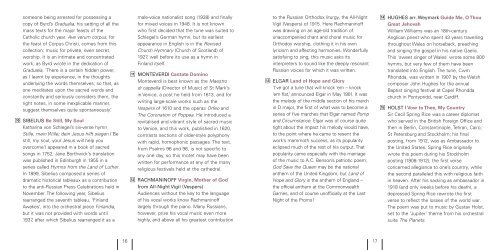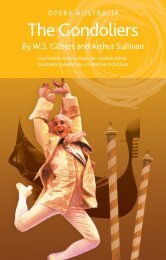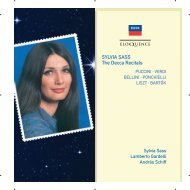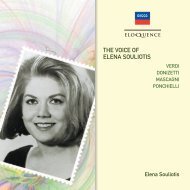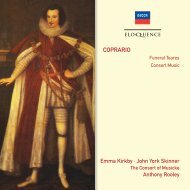The World's Greatest Choral Music - Buywell
The World's Greatest Choral Music - Buywell
The World's Greatest Choral Music - Buywell
You also want an ePaper? Increase the reach of your titles
YUMPU automatically turns print PDFs into web optimized ePapers that Google loves.
someone being arrested for possessing a<br />
copy of Byrd’s Gradualia, his setting of all the<br />
mass texts for the major feasts of the<br />
Catholic church year. Ave verum corpus, for<br />
the feast of Corpus Christi, comes from this<br />
collection: music for private, even secret,<br />
worship. It is an intimate and concentrated<br />
work; as Byrd wrote in the dedication of<br />
Gradualia, ‘<strong>The</strong>re is a certain hidden power,<br />
as I learnt by experience, in the thoughts<br />
underlying the words themselves; so that, as<br />
one meditates upon the sacred words and<br />
constantly and seriously considers them, the<br />
right notes, in some inexplicable manner,<br />
suggest themselves quite spontaneously.’<br />
0 SIBELIUS Be Still, My Soul<br />
Katharina von Schlegel’s six-verse hymn<br />
Stille, mein Wille; dein Jesus hilft siegen (‘Be<br />
still, my soul, your Jesus will help you<br />
overcome’) appeared in a book of sacred<br />
songs in 1752; Jane Borthwick’s translation<br />
was published in Edinburgh in 1855 in a<br />
series called Hymns from the Land of Luther.<br />
In 1899, Sibelius composed a series of<br />
dramatic historical tableaux as a contribution<br />
to the anti-Russian Press Celebrations held in<br />
November. <strong>The</strong> following year, Sibelius<br />
rearranged the seventh tableau, ‘Finland<br />
Awakes’, into the orchestral piece Finlandia,<br />
but it was not provided with words until<br />
1937, after which Sibelius rearranged it as a<br />
16<br />
male-voice nationalist song (1938) and finally<br />
for mixed voices in 1948. It is not known<br />
who first decided that the tune was suited to<br />
Schlegel’s German hymn, but its earliest<br />
appearance in English is in the Revised<br />
Church Hymnary (Church of Scotland) of<br />
1927, well before its use as a hymn in<br />
Finland itself.<br />
! MONTEVERDI Cantate Domino<br />
Monteverdi is best known as the Maestro<br />
di cappella (Director of <strong>Music</strong>) of St Mark’s<br />
in Venice, a post he held from 1613, and for<br />
writing large-scale works such as the<br />
Vespers of 1610 and the operas Orfeo and<br />
<strong>The</strong> Coronation of Poppea. He introduced a<br />
revitalised and vibrant style of sacred music<br />
to Venice, and this work, published in 1620,<br />
contrasts sections of older-style polyphony<br />
with rapid, homophonic passages. <strong>The</strong> text,<br />
from Psalms 96 and 98, is not specific to<br />
any one day, so this motet may have been<br />
written for performance at any of the many<br />
religious festivals held at the cathedral.<br />
@ RACHMANINOFF Virgin, Mother of God<br />
from All-Night Vigil (Vespers)<br />
Audiences without the key to the language<br />
of his vocal works know Rachmaninoff<br />
largely through the piano. Many Russians,<br />
however, prize his vocal music even more<br />
highly, and above all his greatest contribution<br />
to the Russian Orthodox liturgy, the All-Night<br />
Vigil (Vespers) of 1915. Here Rachmaninoff<br />
was drawing on an age-old tradition of<br />
unaccompanied chant and choral music for<br />
Orthodox worship, clothing it in his own<br />
lyricism and affecting harmonies. Wonderfully<br />
satisfying to sing, this music asks its<br />
interpreters to sound like the deeply resonant<br />
Russian voices for which it was written.<br />
£ ELGAR Land of Hope and Glory<br />
‘I’ve got a tune that will knock ‘em – knock<br />
‘em flat,’ announced Elgar in May 1901. It was<br />
the melody of the middle section of his march<br />
in D major, the first of what was to become a<br />
series of five marches that Elgar named Pomp<br />
and Circumstance. Elgar was of course quite<br />
right about the impact his melody would have,<br />
to the point where he came to resent the<br />
work’s mammoth success, as its popularity<br />
eclipsed much of the rest of his output. That<br />
popularity came especially with the marriage<br />
of the music to A.C. Benson’s patriotic poem;<br />
God Save the Queen may be the national<br />
anthem of the United Kingdom, but Land of<br />
Hope and Glory is the anthem of England –<br />
the official anthem at the Commonwealth<br />
Games, and of course unofficially at the Last<br />
Night of the Proms!<br />
17<br />
$ HUGHES arr. Weymark Guide Me, O Thou<br />
Great Jehovah<br />
William Williams was an 18th-century<br />
Anglican priest who spent 43 years travelling<br />
throughout Wales on horseback, preaching<br />
and singing the gospel in his native Gaelic.<br />
This ‘sweet singer of Wales’ wrote some 800<br />
hymns, but very few of them have been<br />
translated into English. <strong>The</strong> tune, Cwm<br />
Rhondda, was written in 1907 by the Welsh<br />
composer John Hughes for the annual<br />
Baptist singing festival at Capel Rhondda<br />
church in Pontypridd, near Cardiff.<br />
% HOLST I Vow to <strong>The</strong>e, My Country<br />
Sir Cecil Spring Rice was a career diplomat<br />
who served in the British Foreign Office and<br />
then in Berlin, Constantinople, Tehran, Cairo,<br />
St Petersburg and Stockholm; his final<br />
posting, from 1912, was as Ambassador to<br />
the United States. Spring Rice originally<br />
wrote this poem during his Stockholm<br />
posting (1908-1912); the first verse<br />
concerned allegiance to one’s country, while<br />
the second paralleled this with religious faith<br />
in heaven. After his sacking as ambassador in<br />
1918 (and only weeks before his death), a<br />
depressed Spring Rice rewrote the first<br />
verse to reflect the losses of the world war.<br />
<strong>The</strong> poem was put to music by Gustav Holst,<br />
set to the ‘Jupiter’ theme from his orchestral<br />
suite <strong>The</strong> Planets.


